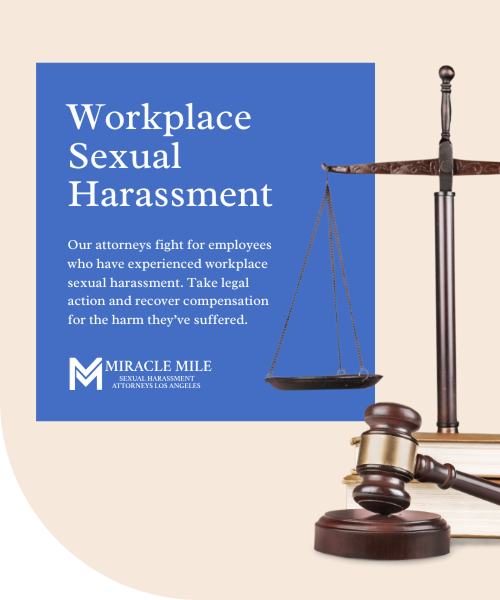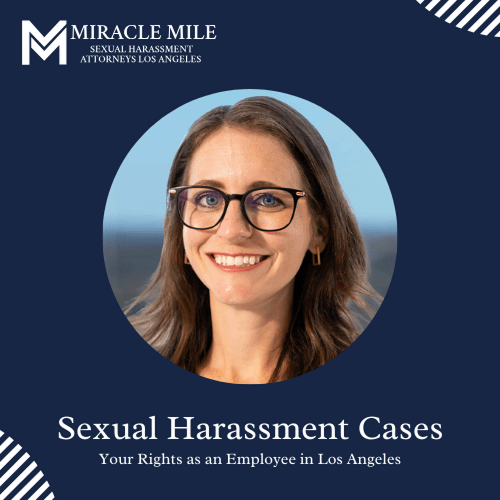Workplace Sexual Harassment Attorneys in Los Angeles
Miracle Mile Law Group is a leading law firm representing employees in Los Angeles who have experienced workplace sexual harassment. If you have been subjected to unwanted advances, inappropriate conduct, or retaliation for reporting harassment, you have the right to take legal action. Our experienced employment attorneys fight for justice, hold employers accountable, and secure the compensation you deserve.
Understanding Your Case
- What is Sexual Harassment in the Workplace?
- What Constitutes Sexual Harassment at Work?
- Who is Liable for Sexual Harassment in the Workplace?
- What to Do If You Are Sexually Harassed in the Workplace
- Hiring an Attorney for a Sexual Harassment Lawsuit in Los Angeles
- Common Damages and Compensation in a Sexual Harassment Lawsuit
- Settlement vs. Trial for Sexual Harassment Cases
- Speak With a Los Angeles Workplace Sexual Harassment Attorney Today

Miracle Mile Law Group Los Angeles Workplace Sexual Harassment Attorney: Caitlyn Handy, Esq.
“Every employee deserves a workplace free from harassment and fear. At Miracle Mile Law Group, we stand with victims of sexual harassment, fighting to hold employers accountable and secure the justice they deserve.”
What is Sexual Harassment in the Workplace?
Workplace sexual harassment includes any unwelcome sexual conduct that creates an intimidating, hostile, or offensive work environment. Under California law (Fair Employment and Housing Act – FEHA) and federal law (Title VII of the Civil Rights Act), employees are protected from sexual harassment in all its forms.
There are two primary types of workplace sexual harassment:
- Quid Pro Quo Harassment: When a supervisor or employer demands sexual favors in exchange for job benefits such as promotions, raises, or continued employment.
- Hostile Work Environment: When an employee experiences severe or pervasive harassment, such as inappropriate comments, touching, jokes, or repeated sexual advances that interfere with their ability to work.
Sexual harassment can happen in person, digitally, or even outside of work settings if it affects the workplace. Employers have a legal duty to prevent and address harassment, and failing to do so can result in legal liability.
What Constitutes Sexual Harassment at Work?
Sexual harassment does not always involve physical contact or direct sexual advances. Many forms of conduct can contribute to an unlawful hostile work environment, including:
- Unwanted Sexual Advances: Persistent requests for dates, suggestive remarks, or inappropriate flirting.
- Verbal Harassment: Sexual jokes, crude remarks, or comments about an employee’s body or appearance.
- Non-Physical Harassment: Invasive staring, suggestive gestures, or offensive sexual innuendos.
- Inappropriate Digital Communication: Sending explicit messages, emails, or images via work platforms.
- Retaliation for Reporting Harassment: Demotion, job loss, or workplace mistreatment after speaking up.
If you have experienced any of these behaviors, you may have grounds for a sexual harassment claim.
Who is Liable for Sexual Harassment in the Workplace?
In California, multiple parties can be held accountable for workplace sexual harassment. Liability depends on who committed the harassment, their role in the company, and whether the employer took action to prevent or stop the misconduct. Both employers and individuals may face legal consequences if harassment is proven.
The Employer: Responsibility Under California Law
Employers in California have a legal obligation to prevent, address, and eliminate sexual harassment in the workplace. Under the Fair Employment and Housing Act (FEHA) and federal law, companies must:
- Implement and enforce anti-harassment policies that clearly define unacceptable behavior.
- Provide regular sexual harassment training for employees and supervisors.
- Investigate complaints promptly and take corrective action when harassment is reported.
- Prevent retaliation against employees who report harassment or participate in investigations.
If an employer fails to take reasonable steps to prevent or address workplace harassment, they can be held liable for damages, including lost wages, emotional distress, and punitive damages. Employers can also be sued for negligent hiring, training, or supervision if they fail to discipline or remove known harassers from the workplace.
Supervisors and Managers: Strict Liability for Sexual Harassment
Supervisors, managers, and executives hold positions of authority, making sexual harassment by someone in a leadership role especially serious. In California, employers are strictly liable for harassment committed by supervisors, meaning:
- If a manager, supervisor, or company owner sexually harasses an employee, the employer automatically bears legal responsibility, even if they were unaware of the misconduct.
- Quid pro quo harassment, where a supervisor conditions job benefits on sexual favors, directly implicates the employer in legal liability.
- If a manager retaliates against an employee for rejecting advances or reporting harassment, both the supervisor and the company may be sued.
Because of this strict liability, companies must ensure that those in leadership positions are properly trained on sexual harassment laws and held accountable for any misconduct.
Coworkers and Third Parties: Indirect Employer Liability
Sexual harassment does not always come from a supervisor. Coworkers, clients, vendors, independent contractors, and even customers can engage in workplace harassment. Under California law:
- Employers must act if they know or should have known that an employee is being harassed by a coworker or third party.
- If an employee reports harassment from a coworker or non-employee, the employer must investigate and take corrective action.
- Failing to protect employees from known harassment can result in employer liability, even if the harasser is not a supervisor.
For example, if an employer allows a vendor to repeatedly harass employees without intervening, they can be sued for failing to provide a safe work environment.
Employer Negligence and Liability for Workplace Harassment
If an employer neglects their responsibilities or ignores complaints, they can be sued for:
- Negligent Hiring: Failing to screen employees for past harassment or misconduct.
- Negligent Retention: Keeping an employee on staff despite complaints or prior harassment allegations.
- Failure to Train: Not providing legally required sexual harassment prevention training.
Failure to Investigate: Ignoring or mishandling harassment complaints.
Employers who do not take immediate, appropriate action to stop harassment may be held responsible in a lawsuit. If you have been sexually harassed at work and your employer failed to protect you, you may be entitled to financial compensation.
What to Do If You Are Sexually Harassed in the Workplace
If you are experiencing sexual harassment, taking the right steps can help protect your rights and strengthen your legal case.
- Document Everything: Keep records of harassment, including dates, times, emails, messages, and witness accounts.
- Report the Harassment to HR or a Supervisor: File a written complaint following company procedures. Keep copies of all correspondence.
- Do Not Retaliate or Quit Without Legal Advice: Leaving your job or reacting emotionally could impact your case. Speak with an attorney first.
- Consult a Sexual Harassment Attorney: A lawyer can review your case, file a legal claim, and protect you from employer retaliation.
If your employer ignores your complaint or retaliates against you, you may have the right to file a lawsuit and seek compensation.
Hiring an Attorney for a Sexual Harassment Lawsuit in Los Angeles
Pursuing a legal claim against an employer can be complex. An experienced sexual harassment attorney can guide you through the process and fight for your rights.
- Case Evaluation: A lawyer will assess the strength of your claim and determine the best course of action.
- Filing a Complaint with Government Agencies: An attorney can help file complaints with the California Civil Rights Department (CRD/DFEH) or Equal Employment Opportunity Commission (EEOC).
- Negotiating a Settlement: Many cases result in substantial settlements without going to trial.
- Taking Your Case to Court: If a fair settlement is not reached, an attorney will aggressively represent you in court.
Miracle Mile Law Group has a proven track record of securing significant settlements and verdicts for employees in Los Angeles.
Common Damages and Compensation in a Sexual Harassment Lawsuit
Victims of sexual harassment may be entitled to significant financial compensation, which can include:
- Lost Wages: Recovery of income lost due to wrongful termination, demotion, or retaliation.
Emotional Distress: Compensation for psychological trauma caused by harassment. - Punitive Damages: Additional penalties against employers for gross negligence.
- Attorney’s Fees: In many cases, the court orders the employer to cover legal costs.
The value of a case depends on the severity of the harassment, employer misconduct, and financial damages suffered. Our attorneys work to maximize the compensation you receive.
Settlement vs. Trial for Sexual Harassment Cases
Many sexual harassment cases are resolved through settlements, but in some instances, going to trial may be necessary.
- Settlement: A faster resolution where the employer agrees to pay compensation without admitting fault. This avoids lengthy court proceedings.
- Trial: If a fair settlement is not offered, taking the case to court may result in a higher compensation award but takes more time.
Our attorneys will evaluate your case and determine the best legal strategy to secure the maximum compensation possible.
Speak With a Los Angeles Workplace Sexual Harassment Attorney Today
If you have experienced workplace sexual harassment in Los Angeles, you do not have to face this alone. Miracle Mile Law Group provides free, confidential case evaluations, and we only charge legal fees if we win your case.
Contact us today to discuss your legal options and fight for the justice you deserve.


Quid pro quo harassment happens when a supervisor or employer demands sexual favors in exchange for job benefits like promotions or raises. It is an abuse of power and illegal under California and federal law. Employees who face retaliation for refusing advances have the right to take legal action.

A hostile work environment happens when repeated harassment creates an intimidating or offensive workplace. This includes inappropriate comments, unwanted advances, or sexual jokes. Employers must prevent and address these conditions, and employees have the right to take legal action.

Employers are responsible for preventing and addressing workplace sexual harassment. They can be held liable if they ignore complaints or allow a hostile work environment. Failure to act can result in legal consequences and compensation for victims.

Retaliation for reporting sexual harassment is illegal under California and federal law. Employers cannot fire, demote, or mistreat employees for speaking out. If you face retaliation after reporting harassment, you have the right to take legal action and seek compensation.
Work With a Top-Rated Los Angeles Workplace Sexual Harassment Attorneys
Aggressive Legal Representation for Employees Facing Sexual Harassment: Our attorneys know how to build strong sexual harassment cases and aren’t afraid to take employers to trial when necessary.
Trusted Los Angeles Law Firm with Proven Results: With millions recovered for workers, Miracle Mile Law Group has earned a reputation for standing up to companies that tolerate harassment.
Confidential Consultations and No Fees Unless You Win: We take cases on contingency, meaning you don’t pay us unless we recover compensation for you. Your privacy and outcome are our top priorities.
Free Consultation
Speak with an attorney. No fees unless we win.
Have Questions? Call us directly at (866) 395-6077 to speak with our sexual harassment attorneys
Free Consultations for Sexual Harassment Cases in Los Angeles
Contact Miracle Mile Law Group today to talk about your case with an experienced sexual harassment attorney.
